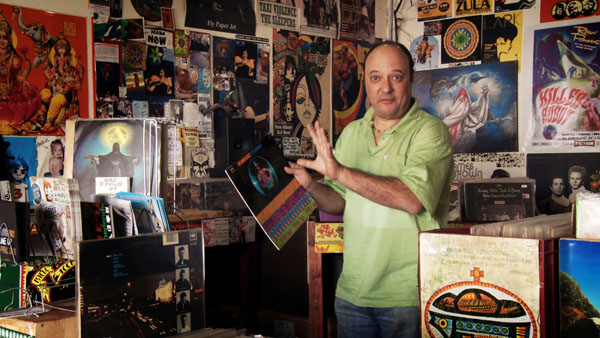
Stephen “Sugar” Segerman in SEARCHING FOR SUGAR MAN (Camilla Skagerstrom/Sony Pictures Classics)
In this entertaining musical mystery tour, pop culture crosses politics and geographical borders to remarkably touch the lives of an artist and his fans in unexpected ways.
From the wide open spaces of the sunny South African veld to the streets of Cape Town, the songs of American singer-songwriter Rodriguez resonated with white liberal Afrikaaners in the 1970s stuck behind the apartheid cultural boycott. Record shop owner Stephen “Sugar” Segerman waxes enthusiastically about the peaceful lyrics and the incendiary legend of the Rodriguez’s public suicide. A local rocker sounds the refrain: “He was the soundtrack of our lives.”
Cut to a dark and stormy night in Detroit, 1968. A real legend, Dennis Coffey, guitarist with Motown’s Funk Brothers, describes being so impressed at Rodriguez’s “ethereal” performance in a Detroit bar that he signed him up to record the album Cold Fact, with its signature track “The Sugar Man” (later sampled by rapper Nas). He thought Rodriguez could become another Donovan-like “new Dylan,” with the additional angle that he was Latino, working-class, and possibly homeless. However, his 1971 London-produced sophomore album, Coming from Reality, slumped in sales worse than his first.
Director Malik Bendjelloul tracks down the account of the first American who brought a copy of a Rodriguez album to South Africa, and how it spread in underground popularity despite slightly rebellious (“Papa don’t allow no new ideas around here”), risqué (“I wonder how many times you had sex”), and poetic hippie lyrics (with mentions of “sweet Mary Jane”), all of which kept it off government-controlled radio. Yet it was a best seller. At first, I began to think this film was about an apocryphal artist, possibly like in Banksy’s Exit Through the Gift Shop (2010). It’s hard to believe that South Africans were so isolated that local fans believed any wild rumor about Rodriguez, including his on-stage death, and didn’t know anything about him, despite clues on the albums, including the well-known producers and references to places in Michigan.
Through interviews and animations, Bendjelloul traced the steps of music journalist Craig Bartholomew-Strydom, who took on Segerman’s challenge in the late 1990s to find out what really happened to Rodriguez, and he found an engaging story so full of colorful characters out of central casting that I was still leery of a hoax. When Bartholomew-Strydom tries to find out where the South African royalties went, he visits the producer of the second album, Steve Rowland, in his luxurious Palm Springs compound surrounded by gold LPs and Hollywood photographs. His memories of Rodriguez add to the mystery. The closest to a villain in the film is the prominent African-American music executive, Clarence Avant, who headed the defunct label Rodriguez recorded for before he went on to run Motown Records. Avant avoids directly answering if he had claimed the royalties and mocks any sales or success in South Africa as insignificant.
Bartholomew-Strydom also found the first album’s Detroit-based co-producer, Mike Theodore, who had gone on to disco-era success. He pops holes in the myths about the singer. He assures the South Africans that Rodriguez is still alive, and the whole tale switches channels to become about a real person and the modern magic of finding long lost people via the Internet. As amazed as the Rodriguez family is to learn about the albums’ popularity overseas, the life and times of the always hardworking, very grounded political activist Sixto Rodriguez turns out to refreshingly depart from the usual stereotype of failed musicians. Topping any American Idol victory, adoringly nostalgic fans welcome him to South Africa at SRO concerts that astonish him—the huge, ecstatic audiences sing along to every word. Bringing it all back home, Sony Legacy has put out a compilation CD, and Rodriguez will be performing around the U.S. in association with this upbeat documentary’s release.






Leave A Comment